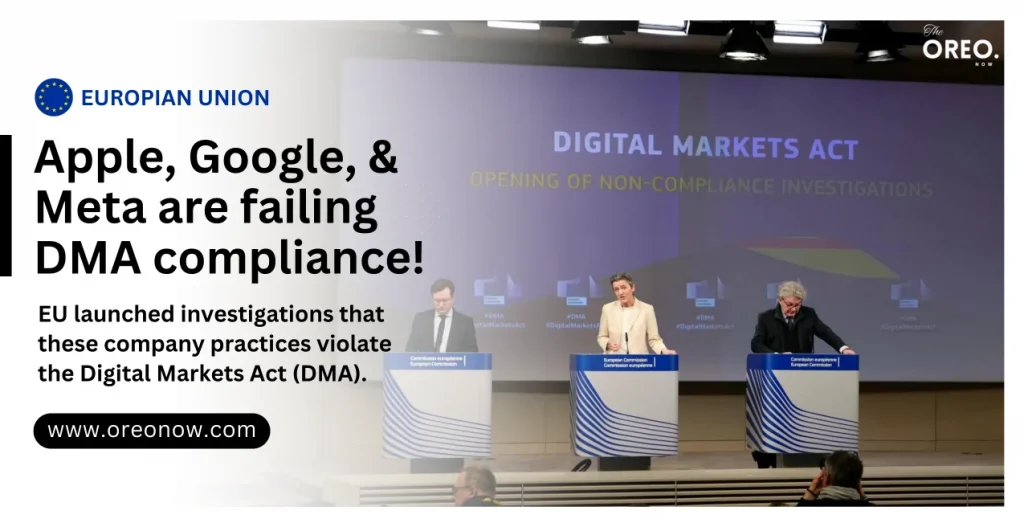EU Investigates Apple, Google, and Meta Over DMA Compliance Issues

The European Union (EU) is flexing its regulatory muscle, launching investigations into three tech giants: Apple, Google’s parent company Alphabet, and Meta (formerly Facebook). The reason? Suspected violations of the newly enforced Digital Markets Act (DMA). Let’s get to know more about these DMA Compliance Issues.
The DMA, introduced in March 2024, aims to create a more level playing field in the digital market by targeting large companies designated as “gatekeepers.” These gatekeepers face new regulations designed to curb anti-competitive practices.
But the EU believes Apple, Google, and Meta may need to be playing by the rules.
Why this investigation? What are DMA Compliance Issues?
- App Store Restrictions: Apple and Google’s app stores are under scrutiny for potentially hindering app developers. The EU suspects restrictions might make it difficult for developers to offer lower prices or use payment methods outside the app stores, limiting consumer choice.
- Search Bias: Google’s search engine is a dominant force, and the EU is investigating whether it prioritises Google’s services in search results. This could give Google an unfair advantage and stifle competition.
- Limited Browser Choice: Apple users might have limited options when it comes to web browsing. The EU is probing whether Apple makes it difficult for users to choose browsers other than Safari on their devices, potentially restricting user freedom.
- Meta’s Subscription Model: Facebook and Instagram, owned by Meta, are exploring subscription models. The EU is looking into Meta’s “pay or consent” system, where users are pressured to pay for a subscription or give up some privacy settings. This raises concerns about user coercion and data exploitation.
The stakes are high. Companies found in breach of the DMA could face significant fines. They haven’t been fined yet. The EU has only launched investigations into Apple, Google, and Meta for suspected violations of the Digital Markets Act (DMA).
If the investigations find them non-compliant, they could face fines of up to 10% of their global annual turnover. This could amount to billions of dollars, but the exact amount would depend on the specific details of each case and the final decision by the EU Commission.
How are these companies reacting to this situation?
All three companies – Apple, Google (Alphabet), and Meta – are pushing back against the EU’s investigations, but in slightly different ways:
Apple stated “They maintain confidence in their DMA compliance and plan to continue cooperating with the EU Commission. Apple highlights efforts to improve developer tools and user choice while emphasizing data security concerns.”
Google said “Similarly, Google emphasizes changes made to its services in Europe to comply with the DMA. They plan to defend their approach during the investigation, likely focusing on the technical aspects of search algorithms and user experience.”
Meta stated “Meta takes a more conciliatory approach, expressing a desire for constructive engagement with the commission. They’ll likely argue that their subscription model offers users more control and complies with the DMA’s spirit, even if the specific implementation is under scrutiny.”
This investigation marks a significant moment. It demonstrates the EU’s commitment to holding big tech companies accountable and fostering a more competitive digital landscape. The outcome will be closely watched by regulators and businesses worldwide and could set a precedent for future tech regulation.
Related Posts

Uber Hot Air Balloon Service in Turkey for $159 | Everything You Need To Know

Google Turns to Nuclear Energy for AI Dominance for Powering its Data Centers

